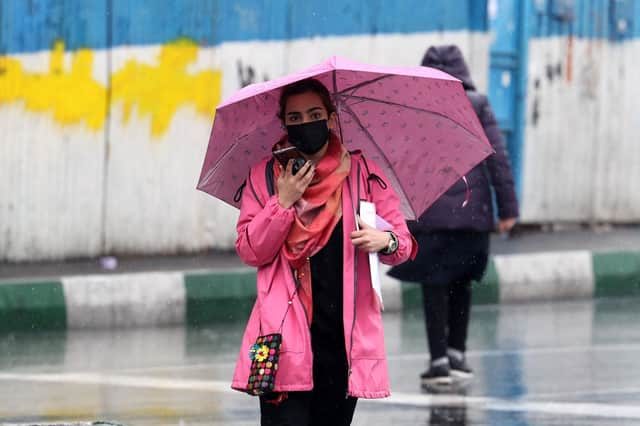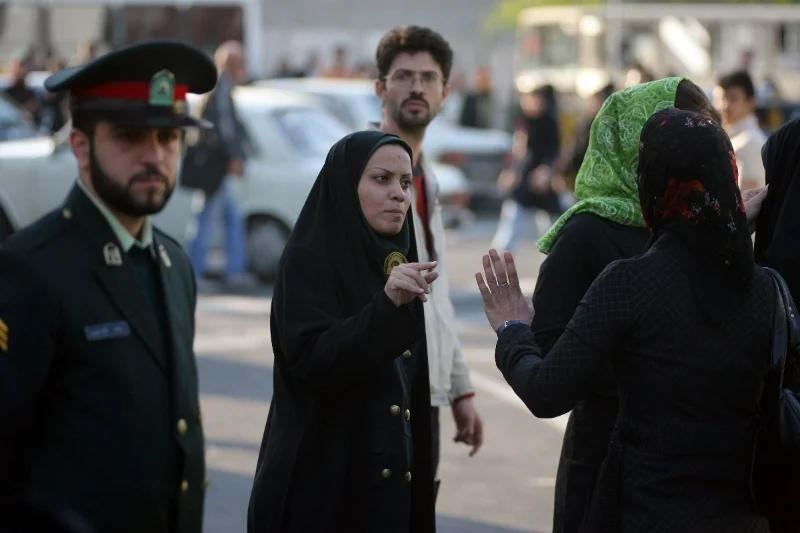UPDATED
Scepticism over scrapping of Iran’s ‘morality police’
It has taken almost three months of protests and the deaths of more than 200 people – including 22-year-old Mahsa Amini, who died after being arrested for allegedly failing to wear her hijab properly.
By Jane Bradley

It has taken almost three months of protests and the deaths of more than 200 people – including 22-year-old Mahsa Amini, who died after being arrested for allegedly failing to wear her hijab properly.
By Jane Bradley

An Iranian woman walks in the street on a rainy day in the capital Tehran, on the day Iran has said it has scrapped its morality police after more than two months of protests triggered by the death of Mahsa Amini following her arrest for allegedly violating the country's strict female dress code.
However, Iranian reformists should now be rejoicing at the news that Iran has disbanded its morality police – a section of the police force responsible for ensuring modesty and propriety.
Yet, that is not the case. Protesters and campaigners, who have been fighting against Iran’s strict hijab laws since Ms Amini’s death in September, claim that the apparent reforms taking place in Iran are bogus. They say that the public announcement is timed to prevent a mass call for a nationwide protest in mid-December.
Mohammad Jafar Montazeri, who has been Attorney General since 2016, announced in response to a direct question on Sunday morning that the morality police had been been “shut down from where they were set up”. His comments come just days after he said he was reviewing the law that requires women to cover their heads, describing it as a “phenomenon that hurts everyone's heart”.
People – mainly women – who broke the code could be arrested by the morality police and taken to “re-education centres” – the first of which was set up in 2019 – where they are usually given classes about Islam and the importance of the hijab, and then forced to sign a pledge to abide by the state’s clothing regulations before being released.
Iranian broadcaster Sima Sabet took to social media to express her scepticism.
"Morality police hasn’t been abolished in Iran,” she wrote. “This is a lie to deceive protester and to divide them just before nationwide calls for protests in the next coming days.”
Indeed, Mr Montazeri’s sudden quest for reform is somewhat unexpected.
The lawyer played a key role in detaining and prosecuting protesters and overseeing provincial prosecutors during the nationwide protests in November 2019. He was quoted as saying accused the protesters of being led by “America, Saudi Arabia and Israel” – a sentiment that has been echoed by the authorities in relation to the current round of protests.
Whether or not the reforms are properly implemented will undoubtedly become more clear over the course of the next month.
However, Iranian reformists should now be rejoicing at the news that Iran has disbanded its morality police – a section of the police force responsible for ensuring modesty and propriety.
Yet, that is not the case. Protesters and campaigners, who have been fighting against Iran’s strict hijab laws since Ms Amini’s death in September, claim that the apparent reforms taking place in Iran are bogus. They say that the public announcement is timed to prevent a mass call for a nationwide protest in mid-December.
Mohammad Jafar Montazeri, who has been Attorney General since 2016, announced in response to a direct question on Sunday morning that the morality police had been been “shut down from where they were set up”. His comments come just days after he said he was reviewing the law that requires women to cover their heads, describing it as a “phenomenon that hurts everyone's heart”.
People – mainly women – who broke the code could be arrested by the morality police and taken to “re-education centres” – the first of which was set up in 2019 – where they are usually given classes about Islam and the importance of the hijab, and then forced to sign a pledge to abide by the state’s clothing regulations before being released.
Iranian broadcaster Sima Sabet took to social media to express her scepticism.
"Morality police hasn’t been abolished in Iran,” she wrote. “This is a lie to deceive protester and to divide them just before nationwide calls for protests in the next coming days.”
Indeed, Mr Montazeri’s sudden quest for reform is somewhat unexpected.
The lawyer played a key role in detaining and prosecuting protesters and overseeing provincial prosecutors during the nationwide protests in November 2019. He was quoted as saying accused the protesters of being led by “America, Saudi Arabia and Israel” – a sentiment that has been echoed by the authorities in relation to the current round of protests.
Whether or not the reforms are properly implemented will undoubtedly become more clear over the course of the next month.
Activity of ‘morality police’ in Iran terminated

Elnur BaghishovRead more
Society Materials 4 December 2022 BAKU, Azerbaijan, December 4. The activity of the ‘morality police’ in Iran has been terminated due to not belonging to the country’s judicial system, Attorney-General of Iran Mohammad Jafar Montazeri said, Trend reports referring to Iranian Media.Montazeri emphasized that of course, Iran's Judicial System will continue to control the behavior in the country.
The protests in Iranian cities are ongoing, prompted by the death of a 22-year-old Iranian woman Mahsa Amini, allegedly after being beaten by Iran's morality police while in custody for violating the strict hijab-wearing rules. Amini's death on September 16 triggered mass protests in Iran several days later.
Hijab was made mandatory for women in Iran shortly after the country’s 1979 revolution. Women who break the strict dress code risk being arrested by Iran’s morality police. Based on the dress code, women are required to fully cover their hair in public and wear long, loose-fitting clothes.
After the mentioned incident, a wave of protests has taken place in Iran, and the protests now cover various fields, economy, social inequality, ethnic inequality, etc.
Society Materials 4 December 2022
The protests in Iranian cities are ongoing, prompted by the death of a 22-year-old Iranian woman Mahsa Amini, allegedly after being beaten by Iran's morality police while in custody for violating the strict hijab-wearing rules. Amini's death on September 16 triggered mass protests in Iran several days later.
Hijab was made mandatory for women in Iran shortly after the country’s 1979 revolution. Women who break the strict dress code risk being arrested by Iran’s morality police. Based on the dress code, women are required to fully cover their hair in public and wear long, loose-fitting clothes.
After the mentioned incident, a wave of protests has taken place in Iran, and the protests now cover various fields, economy, social inequality, ethnic inequality, etc.
Iran abolishes morality police after months-long anti-hijab protests
Iran's Attorney General Mohammad Jafar Montazeri announced that the country's morality police has been abolished following months of protests triggered by Mahsa Amini's death.

Anti-hijab protests swept Iran after the death of 22-year-old Mahsa Amini who died after being in detention by morality police.


No comments:
Post a Comment